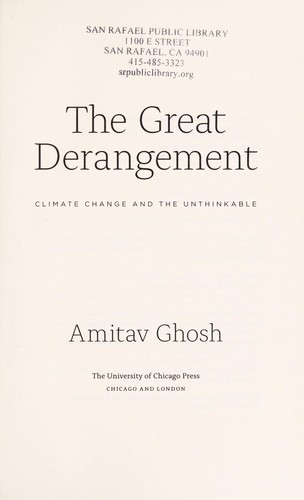Navigating the Climate Crisis: A Strategic Approach
Introduction to The Great Derangement
Amitav Ghosh’s “The Great Derangement” delves into the complex intersection of climate change, culture, and politics. The book challenges readers to rethink how they perceive and engage with the climate crisis, presenting it not just as an environmental issue but as a profound cultural and political challenge. For professionals, the insights offered by Ghosh can be reframed into strategic guidance for navigating the uncertain terrain of the 21st century.
The Cultural Blind Spot
Ghosh argues that one of the primary reasons for the inadequate response to climate change is a cultural blind spot. In professional terms, this can be seen as a failure to integrate environmental considerations into the core strategic frameworks of businesses and organizations. Just as companies have adapted to digital transformation, they must now incorporate environmental sustainability into their strategic planning.
Strategic Insight: Integrating Sustainability
To address this blind spot, organizations should adopt a sustainability-first mindset. This involves embedding environmental considerations into every aspect of business operations, from supply chain management to product development. By doing so, companies can not only mitigate risks associated with climate change but also unlock new opportunities for innovation and growth.
The Politics of Inaction
Ghosh highlights the political dimensions of climate change, noting how short-term political agendas often undermine long-term environmental goals. For professionals, this underscores the importance of strategic foresight and long-term planning. In an era where political landscapes are increasingly volatile, businesses must develop strategies that are resilient to political shifts.
Strategic Insight: Building Resilient Strategies
Organizations should focus on building resilience into their strategic plans. This means anticipating political and regulatory changes and developing flexible strategies that can adapt to new circumstances. By incorporating scenario planning and risk management into their strategic processes, companies can better navigate the uncertainties of the political landscape.
The Role of Storytelling
A central theme in Ghosh’s work is the power of storytelling. He argues that narratives shape our understanding of the world and influence our actions. For professionals, this highlights the importance of effective communication in driving change. Just as digital transformation has reshaped the way businesses communicate, the climate crisis requires a new narrative that emphasizes sustainability and responsibility.
Strategic Insight: Crafting Compelling Narratives
Organizations should invest in crafting compelling narratives that resonate with stakeholders. This involves not only communicating the risks associated with climate change but also highlighting the benefits of sustainable practices. By telling stories that inspire and engage, companies can build stronger relationships with customers, employees, and investors.
The Intersection of Technology and Climate
Ghosh touches on the role of technology in both contributing to and mitigating climate change. For professionals, this presents an opportunity to leverage technological advancements to drive sustainability. Just as AI and digital tools have transformed industries, they can also be harnessed to address environmental challenges.
Strategic Insight: Leveraging Technology for Sustainability
Organizations should explore how emerging technologies can support their sustainability goals. This includes investing in renewable energy, optimizing resource use through data analytics, and developing products and services that reduce environmental impact. By staying at the forefront of technological innovation, companies can enhance their competitive advantage while contributing to a more sustainable future.
Conclusion: Embracing the Challenge
“The Great Derangement” challenges professionals to rethink their approach to climate change, emphasizing the need for cultural, political, and technological transformation. By integrating sustainability into their core strategies, building resilience, crafting compelling narratives, and leveraging technology, organizations can not only address the climate crisis but also thrive in an increasingly complex world.
Final Reflection
Ghosh’s insights provide a valuable framework for professionals seeking to navigate the challenges of the 21st century. By embracing the challenge of climate change, organizations can drive innovation, build resilience, and create a more sustainable future for all.

